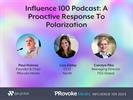Paul Holmes 10 Feb 2003 // 12:00AM GMT
An overwhelming majority of opinion leaders in both the U.S. and Europe consider public relations more credible than advertising, according to the latest Edelman survey on trust and credibility. In the U.S., 86 percent of respondents agreed that “I believe the information I get from articles and news stories more than I believe the information I get from advertisements,” while in Europe 83 percent agreed.
In both the U.S. and Europe, more than 35 percent stated that “experts” and those who are seen as having no vested interest in the welfare of the company—academics, doctors and representatives of NGOs—are among the most trusted spokespersons. Fewer than two in every 10 people said that paid representatives, such as company spokespeople or entertainers/athletes, are credible sources of information.
“This study underscores the importance and influence of media coverage,” said Geoffrey Cowan, Dean of the Annenberg School for Communication at the University of Southern California. “The news media carries a high degree of credibility with opinion leaders, who are eight times more likely to believe information they receive from the news media than from advertising.”
More than 44 percent stated that articles in business magazines and newsweeklies are the most credible sources of information, both of which topped the list across the U.S. and Europe. Corporate advertising and product or service advertising were rated the least credible source of information (5 percent in the U.S.).
In the U.S. and Europe, information derived from independent parties, including colleagues (38 percent+), friends and family (35 percent+), and analysts’ reports (26 percent+) are perceived to be far more credible sources than information from corporate advertising (5 percent) and websites (13 percent).
“This is the first study to clearly demonstrate that you can’t buy credibility through paid media, you have to be credible through actions and transparent, open communications, conveyed through media by independent advocates.” said Steve Lombardo, CEO of Edelman’s StrategyOne research unit.
The survey also found, surprisingly, that trust in business in the U.S. has risen in the past six months despite the recent wave of corporate scandals, while European confidence in business has declined. Almost half (48 percent) of U.S. opinion leaders expressed trust in business, an increase from the 41 percent recorded in the June 2002 survey. Europeans’ trust in business declined from 43 percent in June 2002 to 35 percent today.
Trust in the U.S. government fell dramatically from a post-9/11 high of 48 percent in January 2002 to 39 percent today, while trust in government in Europe remained quite low at 25 percent, down from a peak of 36 percent in June 2001. NGOs are now the most trusted institution in Europe—increasing from 42 percent to 45 percent -- and in the U.S. they are at parity with business, increasing from 38 percent to 49 percent in the past six months.
Says Richard Edelman, president and CEO of Edelman. “Trust in U.S. business is improving because corporations have been taking steps to restore confidence, and there is new legislation like Sarbanes-Oxley, while trust in government in the U.S. is eroding to pre-9/11 levels. At the same time, there is a trust void in Europe, as confidence in business ebbs and trust in government remains low.
“NGOs are now firmly established as the Fifth Estate in global governance, rivaling the credibility of revered corporate brands and filling a trust vacuum in both the U.S. and Europe.”
“Positive attitude towards business are not universal but rather varies sector-by-sector, with residual concerns about the industries that are in the forefront of recent scandals,” commented Richard Breeden, chairman of Corporate Governance Advisors at Edelman and the former chairman of the U.S. Securities and Exchange Commission.
In the U.S., consumer package goods, durables and technology scored more than 65 percent on trust, while scandals and criminal investigations have contributed to making energy, telecommunications, and professional services the least trusted industries, all of which scored less than 38 percent. In Europe, consumer durables, healthcare and airlines are the most trusted, registering 54 percent, while investment/insurance and retail financial services are the least trusted, scoring less than 40 percent.
Other findings from the new study include:
· 71 percent of opinion leaders in the U.S. and 57 percent in Europe trust the company they work for, while only 31 percent in the U.S. and 28 percent in Europe trust global corporations.
· In Europe, the four most trusted brands are NGOs (Amnesty, World Wildlife Fund, Greenpeace, and Oxfam). Although their trust levels declined slightly, they continue to be rated higher than the top-rated corporations (Microsoft and Bayer) by a margin of more than 10 percent.
· In the U.S., the gap between the most trusted brands-Johnson & Johnson, Coca-Cola, Microsoft, Ford, McDonalds, Bayer, and Pfizer (greater than 50 percent)-and the top NGOs is closing (with top NGOs now scoring between 40 and 50 percent).
· Trust in certain American brands, such as McDonalds (55 percent in the U.S.) and Coca-Cola (66 percent in the U.S.) is significantly lower in Europe, where McDonalds is at 22 percent and Coca-Cola is at 37 percent.


































.jpg)
















